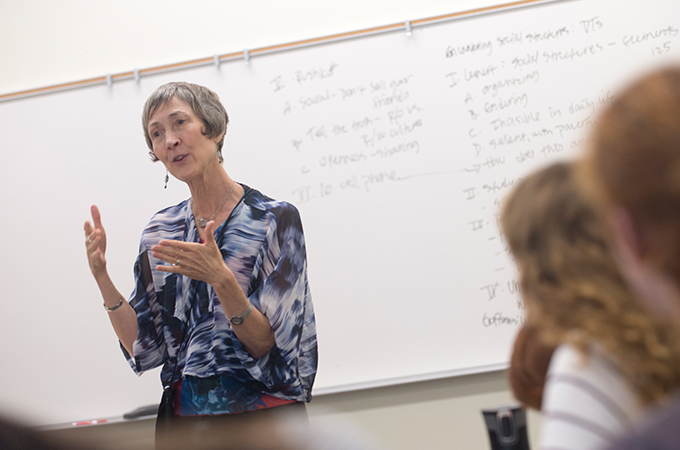Professor of Sociology and Anthropology Sara Schoonmaker has long been fascinated by power and inequality in capitalism, information, and technology. In her new book, Free Software, the Internet, and Global Communities of Resistance, published in 2018 by Routledge, Schoonmaker focuses on how communities navigate the power dynamics of the internet and computer software.
“There is lots of interest in making money from computers, through the internet, telecommunications, and software,” Schoonmaker explains. “I wanted to [investigate] the way capital is shaping the way those systems are used, and how communities throughout the world are discovering ways to gain more control over them.”
As the code that powers computers, mobile devices, the Internet, and social media, software has taken on a pivotal role in the power dynamics of capitalism.
“Free software is based upon open source code, developed in peer communities as well as corporate settings,” she notes. “It challenges the dominance of proprietary software firms like Microsoft and Apple. Free software promotes the digital commons where users are free to access, share, remix, sell, and redistribute software and the myriad cultural products it is used to create.”
Researching the book was a demanding process, she notes. It included interviews with 40 free software and net neutrality advocates from locations including Germany, France, Brazil, and the United States. These advocates hold a common vision of technology and software available for everyone to use.
“I found that people around the world share the goal of making these [systems] available at a community level, rather than having them be controlled by a proprietary system,” she says.
Drawing upon key cases and interviews, Schoonmaker found that the initial foundations for the digital commons were laid in the 1980s, when advocates in the United States and Brazil created free software as a new form of property and opened access to the emerging internet.
Possible pathways for creating the digital commons include free software produced in both peer communities and market-based firms, with the software market itself providing opportunities. By utilizing free software, communities and consumers can produce cultural content, such as videos, music, and more.
“That’s key to what this book is about,” she explains. “Net neutrality and free software communities working to create a digital commons where everyone can access technology and software in an open-control model. That model is very much in conflict with corporations that are trying to make as much money as they can in those areas.”
Learn more about Schoonmaker and studying sociology and anthropology at the U of R.






